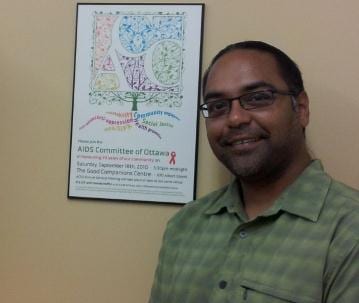After going through a tumultuous period, the AIDS Committee of Ottawa (ACO) has reorganized its board of directors and is busy implementing four strategic directions as part of a five-year plan conceived in 2010.
Khaled Salam has been ACO’s acting executive director since November 2011. Salam is filling in for executive director Kathleen Cummings who is on extended sick leave.
Salam came to ACO in 2003 as a placement student through Algonquin College’s social-work program. After his placement was completed, he acted as ACO’s manager of support services until accepting a promotion to his current post.
Salam says the reshuffling of ACO’s board of directors has been a challenge, yet he’s pleased with the direction the organization is now headed.
“We’re going through a transitional time. Some people are relatively new to their position, so that has definitely been a challenge for us,” he says. “We’ve had changes on many different levels. We still have a few staff members who have been with us for a long time but also a lot of new faces. It’s balanced with an excitement of new energy coming to the organization with new ideas. It feels like a new journey that ACO is on.”
ACO’s vice-chair, Kevin Hatt, says the revised board of directors is now more representative of the populations ACO serves.
“The board has done a good deal of work with membership and tried to develop a closer bond with them,” he says. “I would say the board is the most diverse it’s been in some years. That is a positive sign to the community, that they see themselves reflected in the membership of the board.”
ACO’s board members are working to strengthen and realign their programs and services, raise awareness about HIV/AIDS, enhance ACO’s public image and profile, and secure the organization’s financial future.
Most of ACO’s funding comes from the AIDS Bureau of Ontario, which falls under the umbrella of the Ministry of Health and Long-Term Care. Less than 10 percent of the organization’s funding comes from the City of Ottawa.
Salam says that before 2010, ACO’s board members did not feel fundraising was an urgent matter. It wasn’t until ACO’s various stakeholders asked that the organization become more financially independent that the board reconsidered their tactics.
Sources of revenue include the AIDS Walk and private donations, yet Salam says the board is creatively working on future fundraising events.
ACO works with approximately 140 volunteers and is always seeking dedicated individuals who understand and respect the organization’s cause. Salam points out that ACO’s core values include the greater involvement of people living with HIV/AIDS, harm reduction and anti-oppression.
An ideal ACO volunteer would be familiar with social justice issues, would understand how HIV intersects with poverty, racism and homophobia, and would be able to apply this knowledge to assist those living with HIV/AIDS.
While the future for the populations ACO serves looks bright now, this was not the case when ACO was founded in 1985. Salam says the organization has evolved alongside HIV/AIDS to better serve its clients.
“The organization has evolved to respond to the emerging changes in HIV/AIDS. If you look at our organization today, in terms of our staffing, in terms of our funding, in terms of our programs, our services, they are quite different than what they looked like back in 1985,” he says.
“Back in 1985 the response to HIV/AIDS was quite different to what it is now. HIV/AIDS has evolved into a different illness than it was back in 1985, so our services and programs obviously reflect that. In Ottawa, we are the only HIV/AIDS service, so we have many different populations that are impacted by HIV/AIDS that come and access services. The community that we serve has really diversified compared to 1985.”
ACO’s diverse services include everything from social groups catering to the various populations living with HIV/AIDS to complementary therapies. Hatt says that if ACO was not there to support Ottawa’s at-risk populations, their lives would be living nightmares and the health repercussions would be devastating.
“The membership would be very isolated. I don’t even want to imagine a city without the ACO. My primary concern would be the people who are already infected to feel abandoned. The camaraderie they develop enriches all their lives by letting them know they’re not going through this alone, that they’ve got a good support system to help them through, in some cases, their everyday lives.”


 Why you can trust Xtra
Why you can trust Xtra


